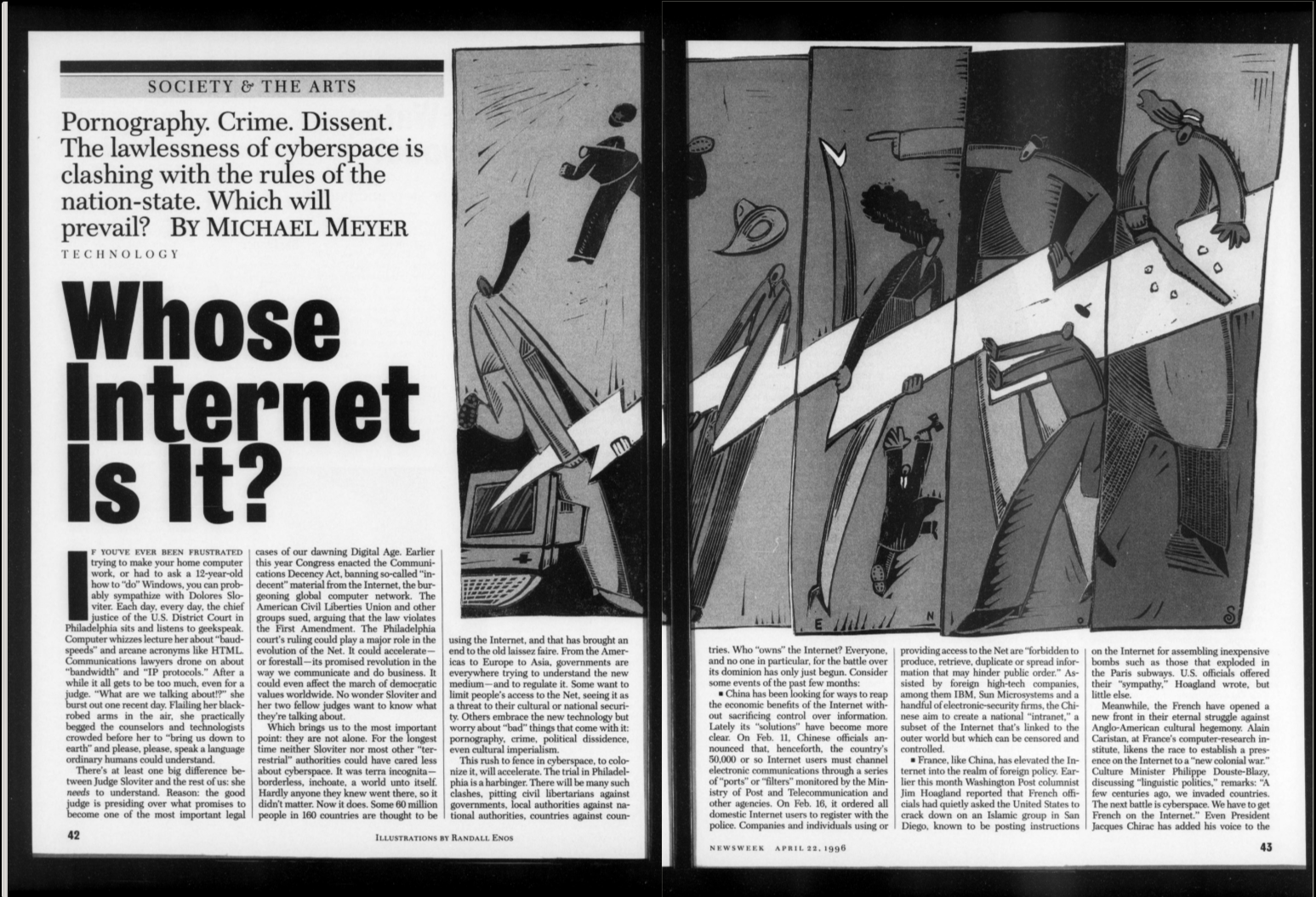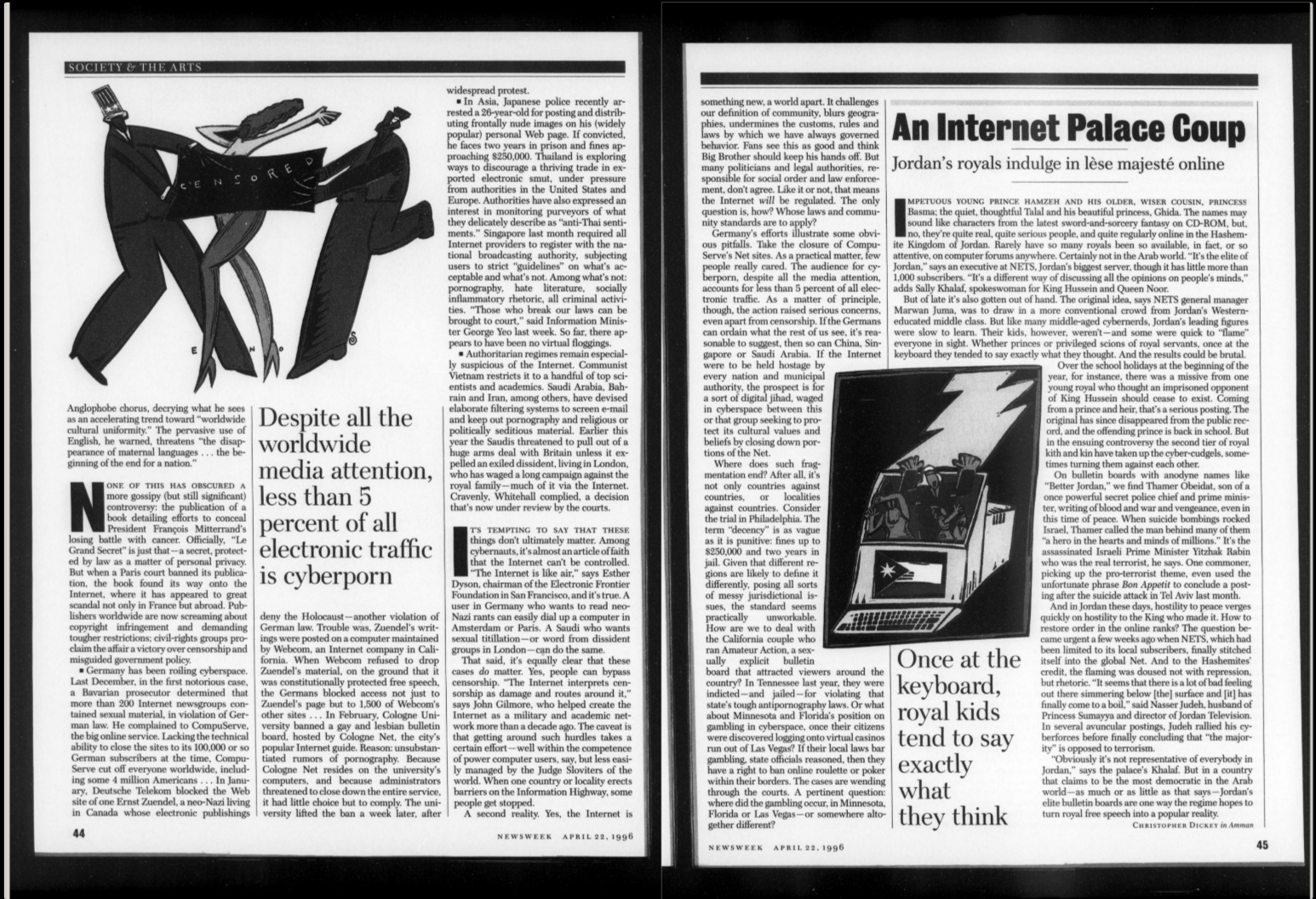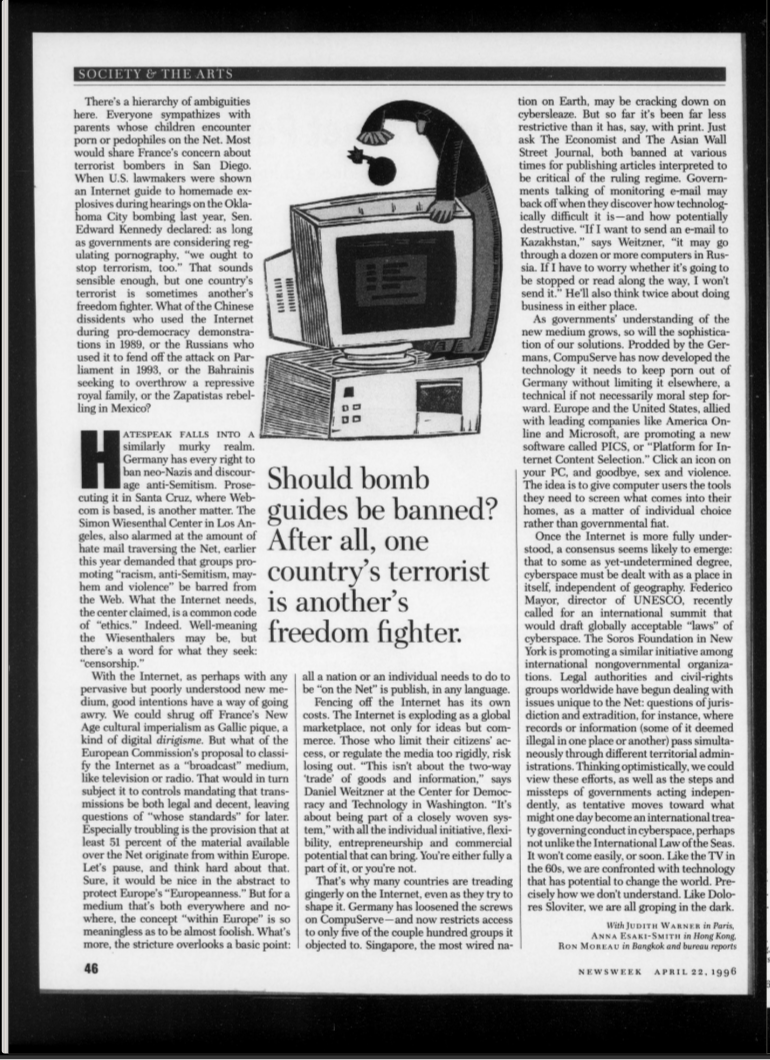Michael Meyer
Whose Internet Is It?
Pornography. Crime. Dissent. The lawlessness of cyberspace is clashing with the rules of the nation-state. Which will prevail?
If YOUVE EVER BEEN FRUSTRATED trying to make your home computer work, or had to ask a 12-year-old how to "do" Windows, you can probably sympathize with Dolores Sloviter. Each day, every day, the chief justice of the U.S. District Court in Philadelphia sits and listens to geekspeak Computer whizzes lecture her about "baud- speeds" and arcane acronyms like HTML Communications buyers drone on about "bandwidth" and “IP protocols." After a while it all gets to be too much, even for a judge. "What are we talking about!?" she burst out one recent day. Hailing her black- robed arms in the air. she practically begged the counselors and technologists crowded before her to "bring us down to earth" and please, please, speak a language ordinary humans could understand.
There’s at least one big difference between Judge Sloviter and the rest of us: she needs to understand. Reason: the good judge is presiding over what promises to become one of the most important legal cases of our dawning Digital Age. Earlier this year Congress enacted the Communications Decency Act. banning so-called "indecent" material from the Internet, the burgeoning global computer network. The American Civil liberties Union and other groups sued, arguing that the law violates the First Amendment. The Philadelphia court’s ruling could play u major role in the evolution of the Net. It could accelerate - or forestall-its promised revolution in the way we communicate and do business. It could even affect the march of democratic values worldwide. No wonder Sloviter and her two fellow judges want to know what they're talking about.
Which brings us to the most important point: they are not alone. For the longest time neither Sloviter nor most other "terrestrial" authorities could have cared less about cyberspace. It was terra incognita — borderless, inchoate, a world unto itself. Hardly anyone they knew went there, so it didn’t matter. Now it does. Some 60 million people in 160 countries are thought to be using the Internet, and that has brought an end to the old laissez faire. From the Americas to Europe to Asia, governments are everywhere trying to understand the new medium - and to regulate it. Some want to limit people's access to the Net. seeing it as a threat to their cultural or national security. Others embrace the new technology but worry about "bad" things that come with it: pornography, crime, political dissidence, even cultural imperialism.
This rush to fence in cyberspace, to colonize it. will accelerate. The trial in Philadelphia is a harbinger. There will be many such clashes, pitting dvil libertarians against governments, local authorities against national authorities, countries against countries. Who "owns” the Internet? Everyone, and no one in particular, for the batt Ie over its dominion has only just begun. Consider some events of the past few months:
-
China has been looking for ways to reap the economic benefits of the Internet without sacrificing control over information. Lately its "solutions" have become more clear. On Feb. 11. Chinese officials announced that, henceforth, the country's 50.000 or so Internet users must channel electronic communications through a series of “ports" or "filters" monitored by the Ministry of Post and Telecommunication and other agencies. On Feb. 16. it ordered all domestic Internet users to register with the police. Companies and individuals using or providing access to the Net are "forbidden to produce, retrieve, duplicate or spread information that may hinder public order " Assisted by foreign high-tech companies, among them IBM. Sun Microsystems and a handful of electronic-security firms, the Chinese aim to create a national “intranet." a subset of the Internet that's linked to the outer world but which can be censored and controlled.
-
France, like China, has elevated the Internet into the realm of foreign policy. Earlier this month Washington Post columnist Jim llougland reported that French officials had quietly asked the United States to crack down on an Islamic group in San Diego, known to be posting instructions on the Internet for assembling inexpensive bombs such as those that exploded in the Paris subways. U.S. officials offered their “sympathy," Hoagland wrote, but little else.
Meanwhile, the French have opened a new front in their eternal struggle against Anglo-American cultural hegemony. Alain Caristan. at France's computer-research institute. likens the race to establish a presence on the Internet to a “new colonial war." Culture Minister Philippe Douste-Bkuy. discussing "linguistic politics." remarks: “A few centuries ago. we invaded countries The next battle is cyberspace. We have to get French on the Internet." Even President Jacques Chirac has added his voice to the Anglophobe chorus, decrying what he secs as an accelerating trend toward "worldwide cultural uniformity " The pervasive use of English, he warned, threatens "the disappearance of maternal languages ... the beginning of the end for a nation."
NONE OF THIS HAS OBSCURED A more gossipy (but still significant) controversy: the publication of a book detailing efforts to conceal President François Mitterrand's losing battle with cancer. Officially. “Le Grand Secret" is just that — a secret, protected by law as a matter of personal privacy. But when a Paris court banned its publication. the book found its way onto the Internet, where it has appeared to great scandal not only in France but abroad. Publishers worldwide are now screaming about copyright infringement and demanding tougher restrictions; cnil-rights groups proclaim the affair a victory oxer censorship and misguided government policy.
-
Germany has been roiling cyberspace. I.ast December, in the first notorious ease, a Bavarian prosecutor determined that more than 200 Internet newsgroups contained sexual material, in violation of German law. He complained to CompuServe, the big online service. I jacking the technical ability to close the sites to its 100.000 or so German subscribers at the time. CompuServe cut off everyone worldwide, including some 1 million Americans ... In January. Deutsche Telekom blocked the Web site of one Ernst Zuendel. a neo-Nazi living in Canada whose elect runic publishings deny the Holocaust—another violation of German law. Thaihle was. Zuendel's writings were posted on a computer maintained by Webcom. an Internet company in California. When Webcom refused to drop Zuendel's material, on the ground that it was constitutionally protected free speech, the Germans blocked access not just to Zuendcl's page but to 1.500 of Webcom's other sites ... In February. Cologne University banned a gay and lesbian bulletin board, hosted by Cologne Net. the city's popular Internet guide. Reason: unsubstantiated minors of pornography. Because Cologne Net resides on the university’s computers, and because administrators threatened to close down the entire service, it had little choice but to comply. The university lifted the ban a week later, after widespread protest.
Despite all the worldwide media attention, less than 5 percent of all electronic traffic is cyber porn
-
In Asia. Japanese police recently arrested a 26-year-old for posting and distributing frontally nude images on his (widely popular) personal Web page If convicted, he faces two years in prison and fines approaching $250.000. Thailand is exploring ways to discourage a thriving trade in exported electronic smut, under pressure from authorities in the United States and Europe. Authorities have also expressed an interest in monitoring purveyors of what they delicately describe as “anti-Thai sentiments.” Singapore last month required all Internet providers to register with the national broadcasting authority, subjecting users to strict "guidelines” on what's acceptable and what's not. Among what's not: pornography, hate literature, socially inflammatory rhetoric, all criminal activities. “Those who break our laws can be brought to court." said Information Minister George Yeo last week. So far. there appears to have been no virtual floggings.
-
Authoritarian regimes remain especially suspicious of the Internet. Communist Vietnam restricts it to a handful of top scientists and academics Saudi Arabia. Bahrain and Iran, among others, have devised elaborate filtering systems to screen e-mail and keep out pornography and religious or politically seditious material. Earlier this year the Saudis threatened to pull out of a huge arms deal with Britain unless it expelled an exiled dissident, living in Ixmdon. who has waged a long campaign against the royal family-much of it via the Internet. Cravcnly, Whitehall complied, a decision that's now under review by the courts.
ITS TEMPTING TO SAY THAT THESE things don't ultimately matter. Among cybernauts. it's almost an article of faith that the Internet can't be controlled. "The Internet is like air." says Esther Dyson, chairman of the Electronic Frontier Foundation in San Francisco, and it's true. A user in Germany who wants to read neo- Nazi rants can easily dial up a computer in Amsterdam or Paris. A Saudi who wants sexual titillation—or word from dissident groups in London—can do the same.
That said, it’s equally dear that these cases do matter. Yes. people can bypass censorship. "The Internet interprets censorship as damage and routes around it." says John Gilmore, who helped create the Internet as a military and academic network more than a decade ago. The caveat is that getting around such hurdles takes a certain effort - well within the competence of power computer users, say. but less easily managed by the Judge Sloviters of the world. When one country or locality erects harriers on the Information Highway, some people get stopped.
A second reality. Yes, the Internet is something new. a world apart. It challenges our definition of community, blurs geographies. undermines the customs, rules and laws by which we have always governed behavior. Fans see this as good and think Big Brother should keep his hands off. But many politicians and legal authorities, responsible for social order and law enforcement. don't agree. Like it or not. that means the Internet will be regulated The only question is. how? Whose laws and community standards are to apply?
Germany's efforts illustrate some obvious pitfalls. Take the closure of CompuServe's Net sites. As a practical matter, few people really cared. The audience for cyberporn, despite all the media attention, accounts for less than 5 percent of all electronic traffic. As a matter of principle, though, the action raised serious concerns, even apart from censorship. If the Germans can ordain what the rest of us see. it's reasonable to suggest, then so can China. Singapore or Saudi Arabia. If the Internet were to be held hostage by every nation and municipal authority, the prospect is for a sort of digital jihad, waged in cyberspace between this or that group seeking to protect its cultural values and beliefs by closing down portions of the Net.
Where docs such fragmentation end? After all. it's not only countries against countries. or localities against countries. Consider the trial in Philadelphia The term "decency” is as vague as it is punitive: fines up to S25O.IXX) and two wars in jail. Given that different regions are likely to define it differently, posing all sorts of messy jurisdictional issues. the standard seems practically unworkable. How are we to deal with the California couple who ran Amateur Action, a sexually explicit bulletin board that attracted viewers around the country"? In Tennessee last year. they were indicted-and jailed—for violating that state's tough antipomography laws. Or what about Minnesota and Florida's position on gambling in cyberspace, once their citizens were discovered logging onto virtual casinos run out of Iuw Vegas? If their local laws bar gambling, state officials reasoned, then they have a right to han online* roulette or poker within their borders. The cases are wending through the courts. A pertinent question: where did the gambling occur, in Minnesota. Florida or lais Vegas—or somewhere altogether different?
There’s a hierarchy of ambiguities here. Everyone sympathizes with parents whose children encounter porn or pedophiles on the Net. Most would share France's concern about terrorist bombers in San Diego. When U.S. lawmakers were shown an Internet guide to homemade explosives during hearings on the Oklahoma City bombing last year. Sen. Edward Kennedy declared: as long as governments are considering regulating pornography, "we ought to slop terrorism, too." That sounds sensible enough, but one country's terrorist is sometimes another's freedom fighter. What of the Chinese dissidents who used the Internet during pro-democracy demonstrations in 1989. or the Russians who used it to fend off the attack on Parliament in 1993. or the Bahrainis seeking to overthrow a repressive royal family, or the Zapatistas rebelling in Mexico?
Hatespeak falls into a similarly murky realm. Germany has every right to ban neo-Nazis and discourage anti-Semitism. Prosecuting it in Santa Cruz, where Web- com is based, is another matter. The Simon Wiesenthal Center in Ixn Angeles. also alarmed at the amount of hale mail traversing the Net. earlier this year demanded that groups promoting "racism. anti-Semitism, mayhem and violence" be barred from the Web What the Internet needs, the center claimed, is a common code of “ethics." Indeed Well-meaning the Wiesent halers may be. but there's a word for what they seek: "censorship."
Should bomb guides be banned? After all, one country’s terrorist is another’s freedom fighter.
With the Internet, as perhaps with any pervasive but poorly understood new medium, good intentions have a way of going awry. We could shrug off France's New Age cultural imperialism as Gallic pique, a kind of digital dirigisme. But what of the European Commission's proposal Io classify the Internet as a "broadcast" medium, like telesision or radio. That would in turn subject it to controls mandating that transmission» be both legal and decent, leaving questions of "whose standards" for later. Especially troubling is the prosision that at least 51 percent of the material available oser the Net originate from within Europe. Let's pause, and think hard about that. Sure, it would be nice in the abstract Io protect Europe's "Europeanness “ But fora medium that's both everywhere and nowhere. the concept "within Europe" is so meaningless as to be almost foolish. What's more, the stricture overlooks a basic point: all a nation or an individual needs to do to be "on the Net" is publish, in any language.
Fencing off the Internet has its own costs. The Internet is exploding as a global marketplace, not only for ideas but commerce. Those who limit their citizens' access. or regulate the media too rigidly, risk losing out. "Thi» isn't about the two-way 'trade' of goods and information." says Daniel Weitzncr at the Center for Democracy and Technolog)' in Washington "It's about being part of a closely woven system." with all the individual initiative, flexibility. entrepreneurship and commercial potential that can bring. You’re cither fully a part of it. or you're not.
That's why many countries are treading gingerly on the Internet, even as they try to shape it. German)- has loosened the screws on CompuServe- and now restricts access to only five of the couple hundred groups it objected to. Singapore, the most wired nation on Earth, may he cracking down on cybersleazc. But so far it’» been far less restrictive than it has. say. with print. Just ask The Economist and The Asian Wal) Street Journal, both Isanncd at various times for publishing articles interpreted to he critical of the ruling regime. Governments talking of monitoring e-mail may back off when they discover how technologically difficult it is—and how potentially destructive. "If I want to send an e-mail to Kazakhstan." says Weitzner, "it may go through a dozen or mon- computers in Russia. If I have to worry whether it's going to be stopped or read along the way. I won't send it." He'll also think twice about doing business in either place.
As governments' understanding of the new medium grows, so will the sophistication of our solutions. I’roddcd by the Germans. CompuServe ha*, now developed the technology it needs to keep pom out of Germany without limiting it elsewhere, a technical if not necessarily moral step forward. Europe and the United Slates, allied with leading companies like America Online and Microsoft, are promoting a new software called PICS, or "Platform for Internet Content Selection." Click an icon on your PC, and goodbye, sex and violence The idea is to give computer users the tools they need to screen what comes into their homes, as a matter of individual choice rather than governmental hat.
Once the Internet is more fully understood a consensus seems likely to emerge: that to some as yet -undetermined degree, cyberspace must be dealt with as a place in itself, independent of geography. Federico Mayor, director of UNESCO, recently called for an international summit that would draft globally acceptable "laws" of cyberspace. The Soros Foundation in New York is promoting a similar initiative among international nongovernmental organizations. Ix-gal authorities and civil-right» groups worldwide have begun dealing with issues uniaue to the Nel: questions of jurisdiction and extradition, for instance, where records or information (some of it deemed illegal in one place or another) pass simultaneously through different territorial administrations. Thinking optimistically, we could view these efforts, as well as the steps and missteps of governments acting independently. as tentative moves toward what might one day become an international treaty governing conduct in cyberspace, perhaps not unlikethe International law of the Seas. It won't come easily, or soon. I -ike the TV in the 00s, we arc confronted with technology that has potential to change the world. Precisely how we don't understand, like Dolores Sloviter, we arc all groping in the dark
With Judith Warner in Paris
Anna Esaki-Smith in Hong Kong,
Ron Moreau in Bangkok and bureau reports



